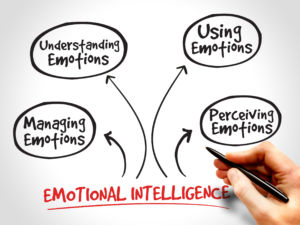Leading With Emotional Intelligence
Course Overview

This course is based on a research by Daniel Goleman which concluded that the high Emotional Intelligence is a bigger predictor of success in executive roles, and that the contribution of EI to success increases at higher levels.
Emotionally intelligent leadership makes a big, measurable difference in three crucial areas: employee retention, productivity, and customer service.
Goal of Course:
This course will provide those who lead with an understanding of emotional intelligence and develop the essential interpersonal and intrapersonal skills for becoming a great leader. As a result their teams and those around them will feel confident, safe and willing to work with them to achieve common goals.
Research shows that emotional intelligence has a direct impact upon organizational performance and that the emotional state of the leader has a big impact upon those around them…
By developing their emotional intelligence leaders will improve their effectiveness in relationships and manage their emotions and those of others so that these emotions work for them not against them.
Duration:
2 days
Language:
English/ Arabic
Training Objectives
- Be able to state what emotional intelligence is and how to develop it
- Know the steps they need to take to become a great leader
- Be able to deal with emotion and changes to development opportunities
- Understand how to coach with compassion
- Learn the ACB Theory of Emotion
- Know how to manage themselves and help others when emotionally hijacked
- Recognize the business benefits of developing emotional intelligence
- Be able to describe what makes a great boss and how to avoid being a rotten boss
- Be able to use positive emotional attractors to motivate others and themselves
- Know how to leverage from the power of relationships and compassion to epitomize team efficiency
- Recognize the impact of emotions in the workplace and when to display emotions
Module Outlines
Module 1: The Value of Emotional Intelligence
- Getting started
- The History of EI
- An overview of the history of EI and how it has developed over time.
- The Business Case for Developing EI
- The importance of EI and building compassion to drive performance
Module 2: EI Competency Framework
- Great Boss v Rotten Boss
- Behaviors of the managers (both past and present) that triggered feelings and emotions within us
- Managing emotions at workplace
- Understanding the differences between emotions and feelings, how they evolve and why they are needed
- Leaders v Managers
- Understanding the differences between managing and leading and the role emotions play
Module 3: Discovering personal EI Competencies through a Self-Assessment
- Applications of Emotional SMARTS
- A self-assessment tool which to identify personal EI strengths and development opportunities.
- Emotional SMARTS Self Reflection
Module 4: Tools and Techniques for Increasing Competence in the Four Domains of EI
- Coaching each other to gain a deeper understanding of their EI profiles.
- Dealing with Emotional Hijacking
- Leading people by understanding ACB model and apply it in their emotional log
- Reviewing personal emotional logs to understand application of ACB model and other material.
Module 5: Using a Variety of Leadership Styles to Increase Emotional Competence
- The importance of validating the emotions in others and how to do it.
- Scenario Test
- Recognizing the potential emotions in others and how to validate them.
- Positive Emotional Attractors v Negative EA’s
- What PEA’s and NEA’s are and how to use them effectively.
- Coaching With Compassion
- Developing the skill of using coaching with compassion to elicit PEA’s in others, and to experience the benefits of having a coach elicit PEA’s.
- Visualizing For Effectiveness
- How to visualize to help create a positive future state, helping participants identify ways to improve the feeling of significance employees have, to encourage actions based on thoughts.
Module 6: Utilizing EI Competencies and Techniques in Leadership Roles
- Personality Contest 1
- Improving the relationships between all employees by heightening awareness of how our perceptions affect our relationships. Helping participants understand how they may be sending out visible messages to employees that are not equal.
- Coming Through
- Strengthening self-awareness and helping participants recognize the need for self-control and when to reveal positive emotions and when to conceal negative ones.
- Common Reactions To Common Emotions
- Understanding the impact common emotions have on the work place.
- Becoming A Great Leader
- The 5 Step Process to becoming a great leader and production of personal leadership vision statements.
- Time To Commit
- Presenting personal vision statements recorded on participant smart phones.
Customized Learning
Leap To Success is offering a variety of learning options to meet current realities and can be adapted to suit your business needs. These options include variants of online, blended and on-site course formats.
Face To Face Learning
Enabling you to have a face to face interactive and engaging learning experiences led by renowned industry experts and thought leaders with extensive practical experience who will employ a variety of interactive learning techniques, including short high-impact videos, case studies, assessments, role plays, in addition to on-going support.
Virtual Learning Labs
Interactive online learning held in real-time using Zoom and are led by international subject matter experts who incorporate case studies, breakout rooms, guided practice, simulations and discussions to maximise your learning experience.
General Methodology
Similar to any L2S training program, this program offers an interactive learning experience in which will allow the delegates to reflect on their learning through an informative, indulging, and fun classroom experience. The design of the training session focuses on the following attributes.
Concrete Experience: The delegates will learn by doing
Reflective Observation: Reflecting on the newly experienced skill-set
Abstract Conceptualization: Developing deeper understanding to the learned concepts
Active Experimentation: Providing the delegates with realistic tools that can be tested in the real life
Nuclear War: who should survive?
This activity will help delegates to understand the importance of their own emotions and its effect on their ability to perform, communicate, lead and focus. It’s a tricky game that starts with slow momentum and the more the delegates engaged in the situation the more challenging it becomes. Delegate during this game will experience many factors that affect directly their emotions. Influencing as means of effective communication. Very interactive game. Duration 120 minutes.
Emotions’ Cards
Introduces an increasingly important topic that underpins good interpersonal skills and good team skills.
Learning Objectives
- Provides a basic understanding of EI
- Identifies typical characteristics of the EI person and typical ways he or she might respond to situations
- Illustrates why it is crucial in work teams
- Highlights key areas that staff can focus on to improve their own EI
- Builds bonds as team members reveal how they would deal with specific situations
- Gives tips on how to make life at work more positive
Interview with Goleman and the Specialists
Today there is a growing body of science in the field of Emotional Intelligence (EI), indicating that proper understanding and use of emotions can help us be more effective workers and better communicators.
This program provides an excellent overview of this topic and includes commentary from EI experts Daniel Goleman, Peter Salovey and others.
Viewers see organizations such as Kaiser Permanente, State Street Bank and Nichols Aluminum where training in EI is being used to help employees create better, more productive working relationships. Through interviews with various employees, participants will see how EI competencies can be combined with other knowledge and technical capabilities to increase one’s overall effectiveness on the job.
Through the video and workshop, participants will learn the five EI competencies:
- Self-Awareness – if we don’t know ourselves, how can we understand others?
- Self-Regulation – checking our emotions and managing them.
- Self-Motivation – directing emotion towards a purpose.
- Empathy – understanding and seeing from another person’s perspective.
- Effective Relationships – interacting and managing relationships.
Sign Up For the Course
